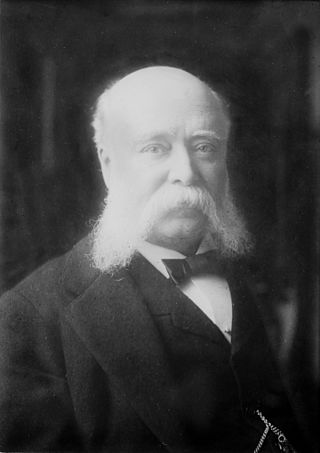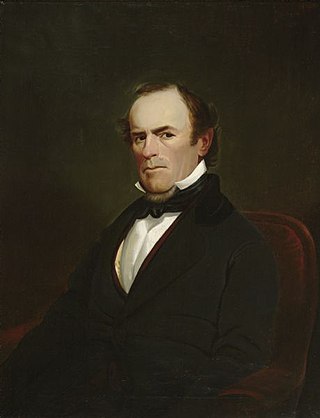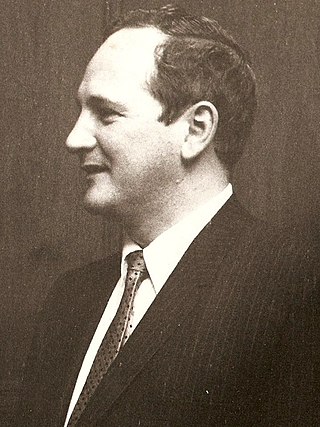
Carl Lovelace was a member of the Wisconsin State Senate.

Carl Lovelace was a member of the Wisconsin State Senate.
Lovelace was born on November 29, 1878, near Wiota in Lafayette County, Wisconsin. [1] During the Spanish–American War, he served with the United States Army. Lovelace was a Private in Troop D of the First United States Volunteer Cavalry, also known as Theodore Roosevelt's "Rough Riders". He participated in the battle at La Guasimas on June 24, 1898, Kettle and San Juan Hills on July 1, 1898, and the siege of Santiago. Lovelace lived in Woodford, Wisconsin and died on February 12, 1941. He is buried in Woodford, Wisconsin. [2]
Lovelace was a member of the Senate representing the 17th district from 1939 until his death. He was a Republican.

Irvine Luther Lenroot was an American attorney, jurist, and Republican Party politician from Wisconsin. He served as Speaker of the Wisconsin State Assembly from 1903 to 1907 and represented the state in the United States Congress from 1909 to 1927, first in the United States House of Representatives until 1918, and then in the United States Senate. After he lost the Republican nomination in 1926, Herbert Hoover nominated him to the United States Court of Customs and Patent Appeals.

William Freeman Vilas was an American lawyer, politician, and United States Senator. In the U.S. Senate, he represented the state of Wisconsin for one term, from 1891 to 1897. As a prominent Bourbon Democrat, he was also a member of the cabinet of U.S. President Grover Cleveland, serving as the 33rd Postmaster General and the 17th Secretary of the Interior.

Charles H. Durkee was an American pioneer, Congressman, and United States Senator from Wisconsin. He was one of the founders of Kenosha, Wisconsin, and was a Governor of the Utah Territory in the last five years of his life.
The 1898 United States House of Representatives elections were held for the most part on November 8, 1898, with Oregon, Maine, and Vermont holding theirs early in either June or September. They were held during the middle of President William McKinley's first term. Elections were held for 357 seats of the United States House of Representatives, representing 45 states, to serve in the 56th United States Congress. Special elections were also held throughout the year.

John Coit Spooner was a politician and lawyer from Wisconsin. He served in the United States Senate from 1885 to 1891 and from 1897 to 1907. A Republican, by the 1890s, he was one of the "Big Four" key Republicans who largely controlled the major decisions of the Senate, along with Orville H. Platt of Connecticut, William B. Allison of Iowa, and Nelson W. Aldrich of Rhode Island.

William Warner was an American lawyer and politician based in Kansas City, Missouri. He became mayor of Kansas City in 1871, serving a one year term. He later represented Missouri in both the U.S. House of Representatives and the U.S. Senate.
Mary Sandra Lovelace Nicholas is a former Canadian senator representing New Brunswick. Sitting with the Progressive Senate Group, she was the first Indigenous woman appointed to the Senate. As an activist on behalf of First Nations women and children, she received international recognition in 1979 for bringing her case to the United Nations Human Rights Committee. In 1985 she succeeded in having Parliament revoke a discriminatory section of the Indian Act, which had caused women marrying non-Aboriginals to lose status and also deprived their children of status but did not treat men the same who married non-Aboriginal women.

John Lendrum Mitchell was an American politician and philanthropist from Milwaukee, Wisconsin. A Democrat, he served one term each in the United States Senate (1893–1899) and House of Representatives (1891–1893). Earlier, he was a member of the Wisconsin State Senate and a Union Army officer in the American Civil War.

John Jacob Esch was an American attorney and member of the United States House of Representatives from 1899 to 1921 serving as a Republican. Born near Norwalk, Wisconsin, he graduated from the University of Wisconsin in 1882 and in 1887 was admitted to the bar. He was a member of the Interstate Commerce Commission from 1921 to 1927. In 1928, President Calvin Coolidge granted him a recess appointment pending his confirmation to a second term; however, the Senate blocked the nomination and the recess appointment expired when Congress adjourned in May. Esch returned to the practice of law and died in La Crosse, Wisconsin.

Stewart Lyndon Woodford was an American attorney and politician who served as a member of the United States House of Representatives and the lieutenant governor of New York.

Henry Cullen Adams was an American farmer, public administrator, and U.S. Congressman from Wisconsin, best known for his support of pure food laws.

Edward Everts Browne was an American lawyer and Republican politician from Waupaca County, Wisconsin. He represented Wisconsin's 8th congressional district in the United States House of Representatives for nine terms (1913–1931).

The 1898–99 United States Senate elections were held on various dates in various states. As these U.S. Senate elections were prior to the ratification of the Seventeenth Amendment in 1913, senators were chosen by state legislatures. Senators were elected over a wide range of time throughout 1898 and 1899, and a seat may have been filled months late or remained vacant due to legislative deadlock. In these elections, terms were up for the senators in Class 1.

Edward Keogh was an Irish American immigrant, printer, Democratic politician, and pioneer settler of Milwaukee, Wisconsin. He served 17 years in the Wisconsin State Assembly between 1860 and 1895, representing Milwaukee's 3rd ward, and was the 37th speaker of the Assembly. He also served two years in the State Senate.

Levi Sterling was an American farmer, politician, and Wisconsin pioneer. He was one of the first American settlers at what is now Iowa County, Wisconsin. He served five years in the Wisconsin Legislature and—before Wisconsin achieved statehood—he served three years in the Wisconsin Territorial Assembly. During the American Civil War, he served as a Union Army cavalry officer.
John Tabor Kingston Jr. was a member of the Wisconsin State Senate during the 1891 and 1893 sessions.

Charles W. Woodford was an American businessman and Illinois Treasurer from 1970 to 1971.

The 2020 Wisconsin Fall general election was held in the U.S. state of Wisconsin on November 3, 2020. All of Wisconsin's eight seats in the United States House of Representatives were up for election, as well as sixteen seats in the Wisconsin State Senate and all 99 seats in the Wisconsin State Assembly. Voters also chose ten electors to represent them in the Electoral College, which then participated in selecting the president of the United States. The 2020 Fall partisan primary was held on August 11, 2020.

The Forty-Third Wisconsin Legislature convened from January 13, 1897, to April 21, 1897, in regular session. They also convened in a special session from August 17 through August 20, 1897.